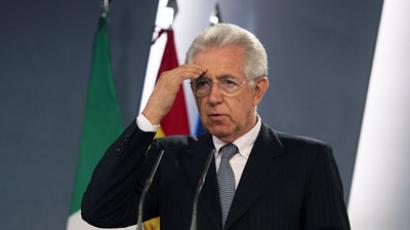'Current EU economic policy is like hitting gas and breaks simultaneously'
After the Euro created artificial booms and busts in the eurozone, as well as a competitiveness problem for the South, Europe is simultaneously saving and pushing a hugely expansionary monetary policy, which will not work, Professor Max Otte told RT.
Otte envisions some countries leaving the Euro, including Greece and at some point Spain and Portugal. As for Greece, it should leave today rather than tomorrow, Otte said, though the Greeks will be in for three to five years of hardship.Doctor Max Otte is a professor for the general and international business administration and the author of the books “Investing Rather Than Saving” and “The Crisis is Coming”, covering the current situation in Europe.RT: Germany currently finds itself in a relatively decent position economically. Can it keep that up?MO: Germany is not at all in the driving seat. Germany’s economy is functioning, but Germany is driven rather than driving, by the processes that are going on. Unfortunately, I think the current system will last for a while because the European political elite have sworn to defend it whatever the costs. And the costs are enormous. So really the current system is hurting Europe we have to make some changes, but I do think that the current state of affairs is going to continue for quite a while.RT: You say Germany is not in a driving seat. What can change that?MO: What we do right now is that we have a fiscal union which is austerity, which means we save on the back of people, of taxpayers. The Euro has created the problems because, as I predicted in 1998, the Euro will create artificial booms in some areas and artificial busts in others, because we don’t have an optimum currency area and that’s exactly what happened. Also it created a competitiveness problem for the South because wages went up and so on but they couldn`t devalue any more. That`s the root cause of the problem. We are trying to mistakenly correct that by saving, by cutting down public deficit which will not work in this situation. At the same time we are saving on the one hand and on the other hand we are having hugely expansionary monetary policy, so we are stepping on a gas pedal with one foot and on the breaks with another. And that`s what frightening. One would have to ask who benefits from that kind of policy.RT: If cutting deficits wouldn’t work, perhaps getting rid of the Euro would?MO: Getting rid of the Euro will be very painful. It would work in the long run because we had the perfect system before – the European monetary system which was just a right mix of flexibility and stability. It was a stable system, but you could adjust it if things went out of hand. So that was a good system going back there theoretically would be great, practically it would not be great because it would be extremely painful, but what I envision is that some countries will leave the Euro, like Greece and maybe later Spain and Portugal, Italy won’t. So in flexible union countries which are not ready should leave and that`s not the end of the Eurozone, quite the contrary it would strengthen the Eurozone. But the European political elite is basically applauding a dogma that if Greece leaves the Euro this means Greece has failed horribly. Greece is basically a failed state. They say if Greece fails, the Euro will fail and Europe will fail. All of this by itself is wrong and its connection is wrong. So we have to ask again who benefits from that state of affairs.RT: If there is a chance that we could see a champions’ league monetary union created? With Germany, Austria, the Netherlands and other countries.MO: There are some proposals out there to really split the Euro into a Northern Euro and Southern Euro. But that will not work for political reasons. You cannot split France and Germany then France will be insulted. That is just not politically feasible. If you do that then you might as well get rid of the Euro completely, so France will have to stay in the champions` league and this by definition would be very difficult. Also who is going to lead the Southern zone? Who is going to be a point around which they will rally? There are much more flexible and sufficient approaches to have individual countries opt out if they cannot comply with current policies. And of course Greece should leave today and not tomorrow because it is really clear – the policies are not working. They are having a austerity program which put the country deeper into difficulties. People are suffering. The only people who are saving are the financial elite. So they save the banks and the creditors at the cost of people. And that`s not right.RT: So you say it will be better for Greece to leave the Euro, take an extreme hardship for a generation and then benefit in the long term.MO: It would be extreme hardship, but we do have extreme hardship right now. I am not sure how much more extreme it can get. And it won’t be a generation, in my projection it will be three to five years. And of course if they leave the eurozone the European countries should stay together, they should give measured aid, they should give support project, they should support certain banks. It`s not the end of European solidarity. It would just be a healthier arrangement.RT: Looking at some of your works you seem to suggest that there is some problem with German mentality when it comes to taking things forward economically.MO: Yes, some of the factors in Europe are still the same. France is behaving like it behaved a hundred and fifty years ago, England is behaving that way, Russia, we will see. But one country that has really changed is Germany. It has a guilt complex still from World War II. We believe that if we just give up sovereignty and German interests we will have Europe. But the jump is a little short. Less Germany doesn’t mean more Europe. If Germany has bargaining chips it should use them, to create a stronger Europe, but I doubt that we will do it by creating the ESM [European Stability Mechanism], by supporting unsustainable arrangement with the Euro as it is, by doing a fiscal pact. So in this sense Germany should indeed assert European interests more strongly.RT: What are these bargaining chips?MO: The bargaining chips are not many anymore. We gave one away again which is the ESM. Still, the European increase in the capital of the ESM requires a scent of parliament and so on. But the parliament is lame, because the major parties in coalition government and outside always agree to stock up the capital. Parliament is not defending Southern budgetary rights. This is our last bargaining chip, Southern budgetary rights.The EMS is a big pot, its there European money will be distributed, something like the IMF and the money should float to countries with problems under certain conditions. At this point how it is constructed we are giving them money without solving any problems and the money is just flowing, exacerbating and prolonging the current unsustainable situation.RT: German Chancellor Angela Merkel has always been a big supporter of the Eurozone, saying it must stick together. Is there a chance that German fiscal decisions are being made on a base of political decision?MO: Mrs Merkel in that case is very much listening to the other countries. At some point she and Sarkozy said if Greece wants to leave it can leave, we are prepared. But that was a short blink of truth. But the dogma is that Europe has to stay together and it is basically a dogma based on wrong premises to blackmail Germany, to blackmail the northern countries for the benefit of large financial institutions, for the benefit of financial oligarchy, for the benefit of Southern countries and the elite of Southern countries.RT: But wouldn’t the Greek exit from the Eurozone be devastating for Germany economically?MO: Germany would be heavily affected if it left the Eurozone, that is why almost nobody is for it in Germany. It would be extremely costly. But so far in history every monetary union at some point has come to an end if there was no political union. So this union will come to an end, but it will be way in the future.RT: So you are suggesting that a political union could be what needed to safe the monetary union.MO: I am a firm believer in the fact that Germany should play its strengths more actively, should have more active stance in negotiations, but also pursue what most Germans really dream of the, United States of Europe. But then we have to start with parliament that is worth it, a government that is elected by that parliament, not a commission. We have to start putting together the true parts of high politics like defense, security. Those things have to be integrated and we have to have principal of solidarity of economic policies. So right now we are building a technocratic euro for the benefit of certain elites, for the benefit of the political elite, for the benefit of the financial elite.RT: Should Germany lead the way into convincing countries that would be in this United States of Europe to essentially give up sovereign rights.MO: Germany cannot lead by itself this German-French tandem. It’s a difficult tandem and I am not sure we can really make it work. But even Sarkozy and Merkel have learnt to work together, but Merkel has been too yielding. So I am not sure how the French-German tandem will work once Germany becomes a bit more assertive. But without French-German cooperation, this would not happen.RT: And the last question. How do you predict the Eurozone future right now?MO: Right now I am predicting that this unsustainable and to some extent, pretty bad state of affairs, is just going to continue. Nobody has the power to really solve it, but everybody is concerned not to let it disintegrate. So I predict more bickering, more economic hardship, more muddling through for at least another two years because the ICB is printing money like crazy. So we are going to sustain the unsustainable state of affairs for another two or three years














